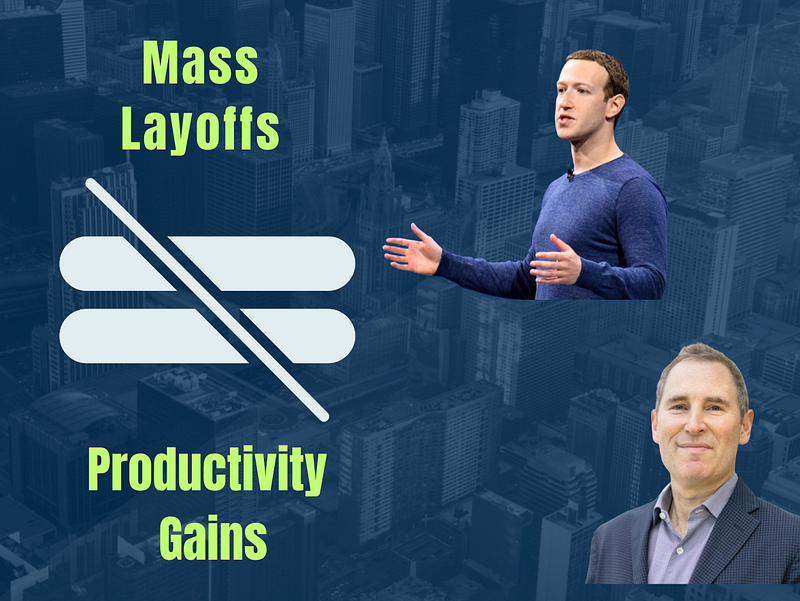Amazon and Meta Layoffs: A Misguided Approach to Efficiency
Written on
Chapter 1: The Layoff Trend
In a recent announcement, Amazon CEO Andy Jassy revealed yet another significant round of layoffs. This latest decision comes on the heels of previous cuts that began in late 2022, which affected over 18,000 employees. These layoffs are part of a broader strategy to reduce expenses amidst an uncertain economic landscape.
Jassy stated that they needed to consider the current economic conditions while planning for the challenges that lie ahead. "The main focus of our annual strategy this year was to streamline operations while ensuring we can still invest significantly in the critical long-term customer experiences that we believe will enhance both customer satisfaction and Amazon's overall performance," he explained.
The current layoffs will predominantly impact Amazon's cloud services, human resources, advertising, and Twitch live-streaming sectors. To put this in perspective, Amazon is currently facing the largest workforce reductions in its history after experiencing a hiring boom during the COVID pandemic. By the end of 2021, the company’s workforce had ballooned to over 1.6 million from just 798,000 at the end of 2019—a remarkable increase.
Mark Zuckerberg, CEO of Meta, has voiced a similar philosophy, suggesting that "leaner is better." However, the reality is that Meta also overexpanded, nearly doubling its workforce during the pandemic. The notion of "leaner" as defined by executives does not equate to "better."
While there is merit in eliminating outdated practices and reallocating resources towards growth areas, we must call it as it is: the root cause of these layoffs is management's error in over-hiring, which ultimately harms employee morale. This trend of corporate executives attributing their hiring miscalculations to a desire for increased efficiency is frustrating.
Zuckerberg has suggested that by "slimming down" the company, employees will find their work to be more productive, enjoyable, and fulfilling. However, work should already encompass enjoyable and fulfilling experiences. If there are employees in roles that do not provide value, why not consider transitioning them to available positions within the organization?
This issue is not unique to Meta; it is a pervasive problem across many tech companies. Such actions can severely hinder productivity. Assuring employees about a promising future at Meta while simultaneously implementing job cuts is detrimental to morale and counterproductive for recruitment efforts.
Stability—including the ability to secure basic needs—is a fundamental human requirement. No one wants to join a company that frequently undergoes mass layoffs, yet Zuckerberg seems to believe that Meta will attract top talent despite its current instability.
Ultimately, layoffs distract employees, stifle innovation, and significantly damage morale. Harvard professor Sandra Sucher aptly pointed out, "You have to step back and say, 'What kind of reasonable businessperson puts people at risk by doubling the size of their organization in two years?' What conditions would justify such a gamble?"
This perspective highlights the shortsightedness of relying solely on layoffs rather than exploring alternative options. Meta, for instance, might benefit more from starting a new venture if it genuinely seeks to transform its operations.
The reality is that Meta has outgrown its startup phase, and Zuckerberg and his team must adapt their management approach accordingly. If I were in his position, I would contemplate, "What objectives do we aim to achieve that Meta is not currently fulfilling?" If the answer diverges from Meta's core mission, then launching a new company may be the most prudent course of action.
If you found this discussion insightful, consider subscribing for more content focused on building wealth through investing and entrepreneurship—available for less than the price of a cup of coffee!
Section 1.1: Layoff Impacts on Corporate Culture
The implications of large-scale layoffs extend beyond immediate financial savings; they can create a toxic corporate environment. Employees left behind often feel insecure and demoralized.

Subsection 1.1.1: The Myth of Efficiency
Many leaders mistakenly equate layoffs with efficiency. However, the reality is that these actions can lead to lower productivity and diminished innovation.
Section 1.2: Alternatives to Layoffs
Exploring options such as internal job rotations and creating new ventures can provide a more sustainable path forward for companies facing workforce challenges.
Chapter 2: The Bigger Picture
In the video titled "Amazon Just Fired Thousands of Remote Workers," we delve into the implications of Amazon's recent layoffs, discussing the broader impact on the tech industry and employee morale.
The second video, "Amazon to lay off 9,000 employees on top of 18,000 in January," explores the reasons behind these layoffs and their potential long-term effects on the company's culture and productivity.